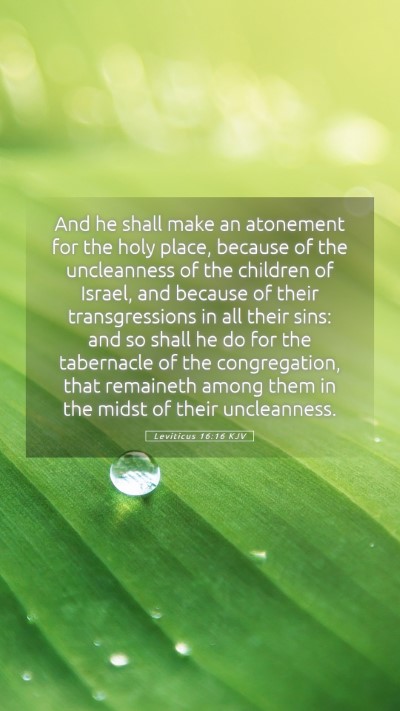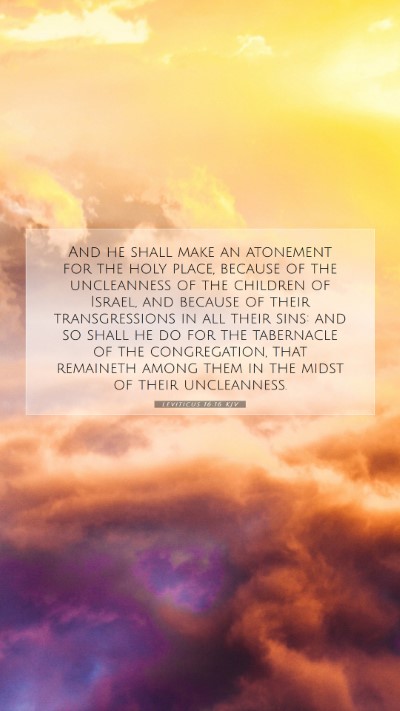Understanding Leviticus 16:16
Bible Verse: Leviticus 16:16 - "And he shall make an atonement for the holy place, because of the uncleanness of the children of Israel, and because of their transgressions in all their sins: and so shall he do for the tabernacle of the congregation, that remaineth among them in the midst of their uncleanness."
Overview
Leviticus 16:16 is part of the instructions given to the Israelites regarding the Day of Atonement (Yom Kippur). This verse emphasizes the need for cleansing and atonement for both individuals and the collective community due to their sins and impurities. It reflects the importance of maintaining holiness in the presence of God.
Commentary Insights
This verse can be deeply understood by exploring various commentaries:
- Matthew Henry's Commentary: Henry highlights the significance of the high priest's role in making atonement for the people. He notes that the need for cleansing reflects the serious nature of sin and how it affects not just the individual but also the community and sacred spaces.
- Albert Barnes' Commentary: Barnes elaborates on the idea that the tabernacle symbolizes God's presence among His people. He explains that the uncleanness and transgressions mentioned signify that sin disrupts the relationship between God and His people, necessitating ritual cleansing for forgiveness and restoration.
- Adam Clarke's Commentary: Clarke delves into the ceremonial aspects of this passage, discussing the process of atonement. He emphasizes how this ritual serves as a foreshadowing of the ultimate sacrifice—Jesus Christ—and the fulfillment of atonement in the New Testament context.
Key Themes
- Atonement: Central to this verse is the concept of atonement, representing reconciliation with God through sacrifice.
- Purity and Holiness: The necessity of maintaining purity for the dwelling place of God underlines the importance of holiness in worship.
- Community Responsibility: The communal aspect of sin indicates that the actions of individuals affect the collective spiritual state of the community.
Application and Relevance
The lessons from Leviticus 16:16 can be applied in various ways:
- Personal Reflection: Believers are encouraged to examine their lives for areas of sin and seek God's forgiveness.
- Community Worship: Understanding the importance of collective purity fosters unity in church communities and strengthens shared faith practices.
- Biblical Foundations of Atonement: The verse serves as a basis for discussing the significance of Jesus' death as the ultimate atonement.
Cross References
- Exodus 30:10 - Discussing the annual atonement for the sins of the people.
- Hebrews 9:7 - Mentioning the old covenant rituals of atonement.
- Isaiah 53:5 - Foretelling the suffering servant who bears the sins of many.
Conclusion
Leviticus 16:16 provides profound insights into the nature of sin, the need for atonement, and God's desire for a holy relationship with His people. The verse reveals key theological concepts that are foundational for understanding both the Old and New Testaments. Leveraging public domain commentaries aids in grasping its rich meaning and applying it to contemporary faith practices.
Further Study Resources
For deeper exploration, consider utilizing:
- Bible study guides focused on the book of Leviticus.
- Online Bible study platforms that offer commentary and analysis.
- Bible study lessons on atonement through various formats like videos, articles, and podcasts.


